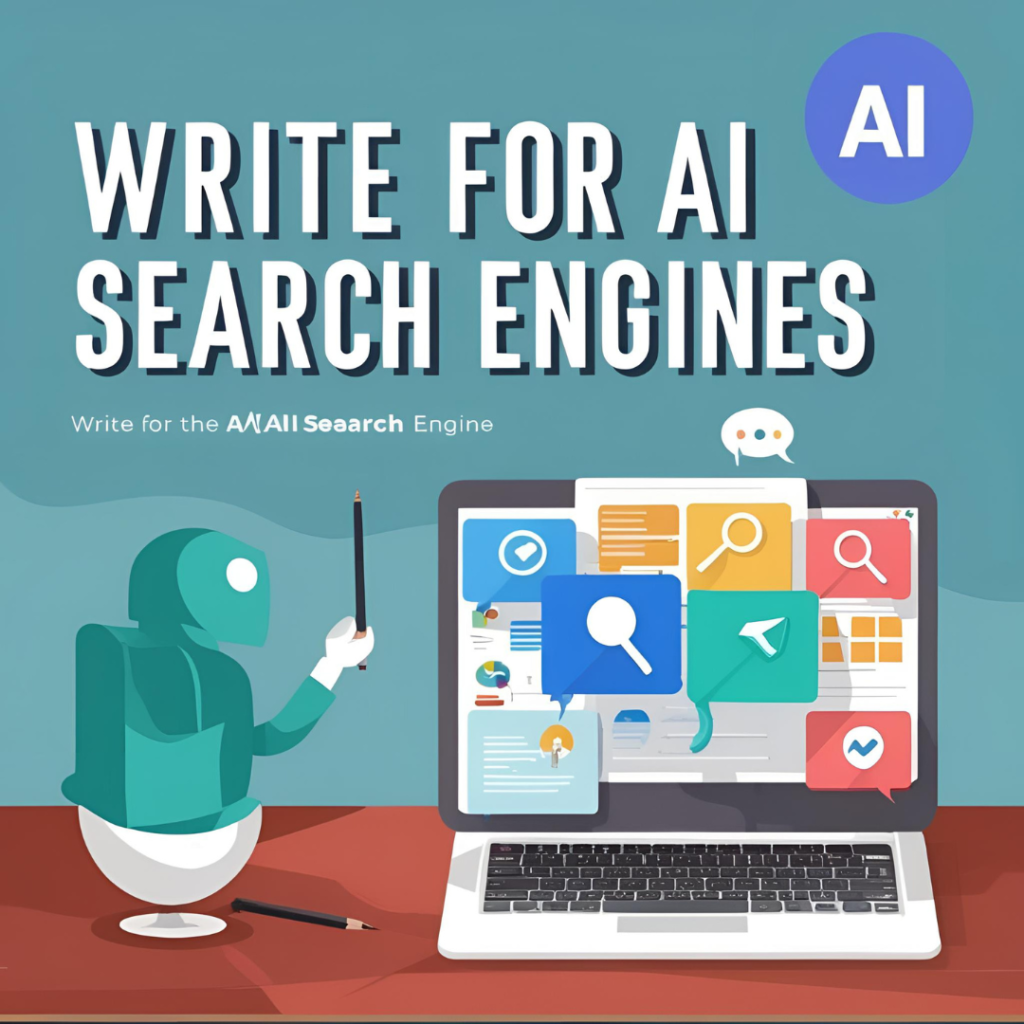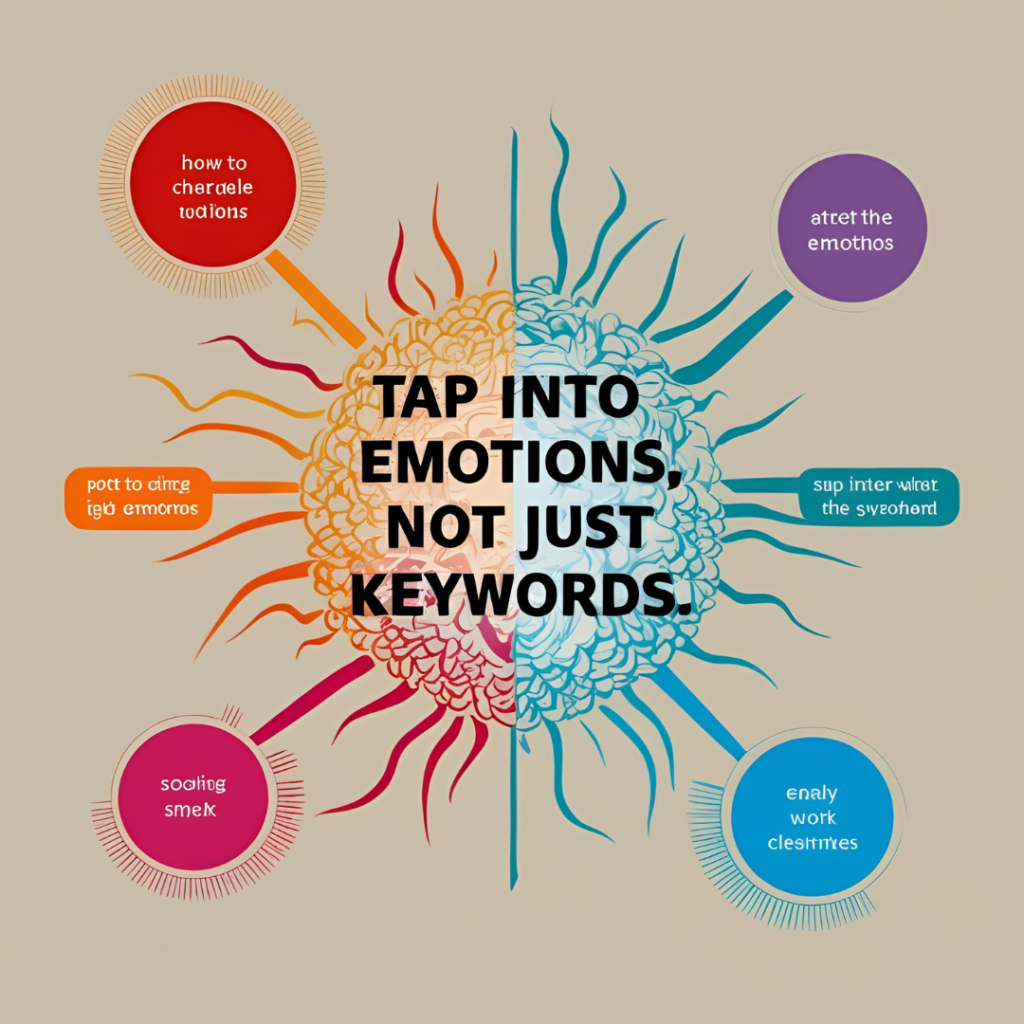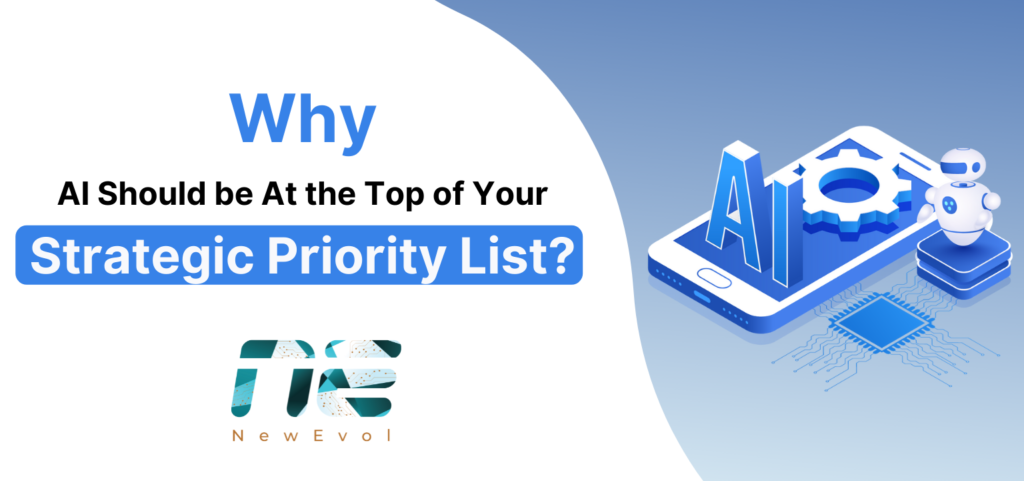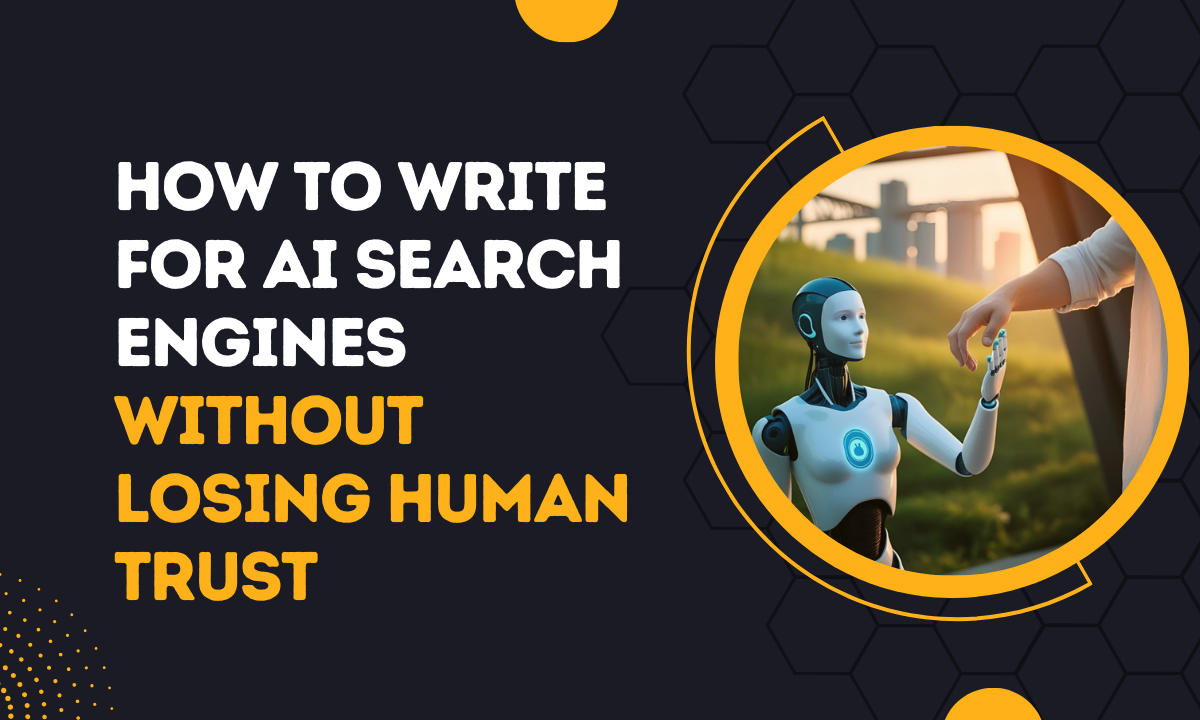How to Write for AI Search Engines Without Losing Human Trust
Learning how to write for AI search engines without losing human trust is crucial in today’s digital landscape.
With AI-powered search tools like Google now reaching over 1.5 billion users, the stakes are higher than ever.
Platforms such as ChatGPT and Bing Copilot are transforming the way we interact with information, but here’s the challenge: AI search prioritizes structure over authenticity.
As the renowned marketing expert, Seth Godin, wisely said, “People don’t buy products, they buy trust.” In this AI era, trust is key.
This article will guide you through how to appeal to AI while keeping that human touch, ensuring your content ranks and connects.
Ready to learn how to balance both? Let’s jump in.
1. How do I write content for AI search engines like Google SGE or ChatGPT?
Let’s face it—the game has changed.
Writing for AI search engines isn’t about stuffing keywords or tricking algorithms anymore.

It’s about understanding how machines think, so your content stays visible and valuable.
Know How AI Interprets Content
AI models like Google SGE and ChatGPT analyze semantic relevance—in simple terms, they look beyond keywords to understand what your content is really saying.
They also prioritize structure and intent.
That means your post should answer real questions clearly and match the searcher’s purpose.
So, what can you do?
Prioritize Clarity and Structure
Start with clean, logical flow. Break things into sections with meaningful headers.
Use bullet points, numbered lists, or even tables where it helps.
Remember: if your reader can skim it, AI can scan it.
And don’t just toss in jargon to sound smart. Speak human.
Add Richness with Entities
What’s an entity
? Think of them as recognizable concepts—brands, people, locations, tools, etc. Mentioning them helps AI place your content in the right knowledge web.
Use FAQs, Summaries, and Natural Language
AI loves well-crafted FAQ sections.
They signal helpfulness and boost your chance of appearing in snippets. Wrap up your posts with crisp summaries.
And write how you talk—because robots understand people-talk better than robot-speak these days.
Ready to write for AI search engines?
Focus on clarity, real answers, and structured flow—and the algorithms will take care of the rest.
2. What’s the best way to rank in AI-powered search?
Let’s be honest—ranking in today’s search landscape isn’t about tricking the system.
It’s about showing up as the real deal.
If you want to write for AI search engines and actually rank, you need to earn your place with clarity, credibility, and technical finesse.
Master E-E-A-T: Your Content’s Secret Sauce
Ever heard of E-E-A-T?
It’s a Google score for SEO, and it stands for Experience, Expertise, Authoritativeness, and Trustworthiness.
And yes, it’s exactly what AI looks for when deciding whether your content is worth surfacing.
So ask yourself—do you sound like someone who knows what they’re talking about?
Do you demonstrate lived experience or cite reputable sources? If not, time to level up.
Optimize for the AI Ecosystem
AI-powered search isn’t just about blog posts anymore. It’s about snippets, panels, and voice.
To show up where it matters, structure your content with intent.
Use clear headings, bulleted lists, quotes from experts, and concise answers.
Want to win featured snippets? Answer the question before it’s even asked.
Use Schema, Tables, and Structured Elements
Here’s where technical meets tactical. Schema markup helps AI understand the “bones” of your content.
Tables?
Lists?
Quotes?
They all help AI sort and surface your content faster.
Because when machines read better, you rank higher.
Bottom line?
If you want to write for AI search engines and actually see results—bring your expertise, structure your content, and don’t shy away from using smart formatting.
That’s how trust is built. And rankings follow.
3. How is writing for AI search different from traditional SEO?
Think writing for AI is just new-age SEO with a fancy name? Not quite.
It’s Less About Keywords, More About Meaning
Gone are the days when cramming the same keyword five times in one paragraph gave you a boost.
AI search engines now look for semantic depth.
That means understanding why someone is searching—not just what they typed.
Example
- Old SEO Approach:
A health blog would keep repeating keywords like “home remedies for sore throat” to rank higher. - Present Semantic Depth Approach:
Now, AI values pages that address the underlying intent, such as:
“What causes a sore throat?”
“When should you see a doctor?”
“Are natural remedies safe for kids?”
By offering a broader, thoughtful, and empathetic discussion, the content matches why someone is searching, not just what they typed.
Instead of obsessing over keyword density, focus on intent.
What problem is the reader trying to solve? What’s the clearest, most human way to answer it?
Context Is King
AI loves content that flows logically.

It reads your page like a person would—evaluating how naturally one idea connects to the next.
You need coherence. You need clarity.
And yes, question-based content is gold. Answering “how,” “why,” or “should I” questions helps your content match the real language people use in AI-powered queries.
Trust Signals Over Backlinks
Backlinks still matter—but AI doesn’t treat them like a golden ticket anymore.
Today, it’s more about trust. Are you citing credible sources?
Are your facts current?
Does your page reflect real expertise?
Formatting also matters.
Structured content—using subheadings, lists, quotes—makes your insights easier to parse, and more likely to be surfaced.
If you want to write for AI search engines, start thinking like a helpful guide, not a salesman.
The goal? Serve users first. AI will notice.
4. How can I make AI-friendly content without sounding robotic?
You want to rank well, but you also want your readers to feel something. So, how do you walk that line between algorithm appeal and authentic voice?
Write Like You’re Talking to a Smart Human
The key? Avoid sounding like you’re writing for a machine. Yes, you’re optimizing for AI, but real people are still the ones clicking, reading, and staying.
So write like you’re explaining things to an intelligent friend over coffee—not drafting a tech manual.
Use natural language. Break things down simply. If you wouldn’t say it out loud, rethink it.
Let Stories and Examples Do the Heavy Lifting

Source: Kelvybird
Dry facts fall flat. But a story?
That sticks.
Add a quick metaphor. Share a relatable scenario.
Those elements help AI recognize context—and make your content more engaging.
Imagine you’re teaching, not preaching. A well-placed example or a little storytelling goes a long way in making content memorable, not mechanical.
Structure for Scannability
People skim. So does AI.
Break long walls of text into digestible chunks. Use headings, bullet points, visuals, and quotes.
This doesn’t just make your post prettier—it makes it more understandable for both readers and search engines.
And yes, when you write for AI search engines, structure is everything.
Think clarity, not clutter.
Bottom line? Write with empathy. Think user-first. And let your human side shine through. The algorithms will reward it.
5. How do I build trust while optimizing for AI search?
Want AI to rank your content higher and keep readers coming back? Then building trust isn’t optional—it’s the foundation.
Show Who’s Behind the Words
People don’t trust faceless content.
Neither do search engines. So, make sure you include an author bio with relevant experience or credentials.
Even a sentence or two helps. It signals real human expertise behind the words.
Credibility increases when the writer feels accessible. Not like some mysterious content bot from nowhere.
Use Sources and Say What You Know
You don’t need to sound academic, but you do need to back things up. Link to trustworthy sites.
When you write for AI search engines, source credibility carries real weight.
But here’s the twist—balance sources with your own experience.
Share real examples.
Add a short case study or a quote from an expert you admire. That blend of fact and personal insight? Gold.
Avoid Clickbait. Be Clear, Not Clever
Overpromising is a quick way to lose trust.

Source: cartoonsbyjim
So skip the clickbait titles and exaggerated claims. Be honest about what the reader will get—and deliver it well.
Transparency, clarity, and firsthand insight go a long way.
Remember, AI is learning to detect trust signals just like humans do. So if it feels shady, it probably won’t rank.
Be real. Be relevant. That’s how you build trust—and authority—without losing your voice.
6. Can AI-generated search results be trusted?
Ever wondered if the AI search answer you just read is actually accurate? You’re not alone. The truth is—it depends.
The Good: Speed, Scope, and Summaries
AI-generated content can be incredibly helpful.
It pulls insights from a wide pool of data, fast. You ask, it answers.
Need a quick explainer, summary, or list of resources? AI delivers in seconds.
And when you write for AI search engines, you’re not just creating for humans anymore—you’re training the bots to prioritize helpful, trustworthy content.
But here’s the catch…
The Not-So-Good: Hallucinations and Missing Sources
AI still makes things up. Often. This is called a “hallucination.”
It means the AI might present information confidently—even if it’s not true.
That’s why you should always verify names, facts, stats, and even quotes.
If it sounds too perfect, double-check it. AI doesn’t always cite sources properly. And sometimes, there’s no source at all.
What Should You Do?
Use AI-generated results as a starting point, not the final word. Look for author names, original sources, or external references. If you can’t trace it? Don’t trust it blindly.
Want to stay ahead? Build your content with credibility baked in.
Share your expertise. Cite real data. Add your voice.
AI will keep improving. But your critical thinking? Still essential.
Because trust online isn’t built by bots. It’s built by you.
7. How to create human-first content in an AI search world?
Let’s be honest. In today’s world of algorithms and automation, it’s easy to forget the real reader behind the screen.
But here’s the golden rule: Write for humans first. Always.
Tap into Emotions, Not Just Keywords

What makes content actually connect? It’s not clever hacks or keyword stuffing. It’s empathy.
Ask yourself: What’s your reader worried about?
Excited for?
Confused by?
The most engaging content answers emotional needs.
Not just informational ones. If you understand what keeps your audience up at night—you won’t just capture attention. You’ll build trust.
Be Clear, Be Kind, Be Useful
Forget jargon. Speak plainly. Use analogies, relatable stories, even humor. Why? Because people crave clarity.
If your content sounds like a manual, they’ll bounce. If it sounds like a friend? They’ll stay—and probably share.
And yes, when you write for AI search engines, don’t sacrifice the human touch. AI rewards relevance—but humans reward resonance.
Prioritize Value, Not Vanity Metrics
Sure, rankings matter. But what’s the point if no one reads beyond the first paragraph?
Focus on helping, not impressing.
Share lessons, lived experience, and real-world insight. Not just facts they can Google in five seconds.
Bottom line?
In an AI-dominated space, the content that wins will feel deeply human.
Because tech might drive visibility—but heart drives impact.
8. What matters more: writing for people or AI?
Here’s a tricky question: Should you write for readers—or for search engines?
Honestly?
It’s not either-or. It’s both.
Smart Strategy: People First, Format for AI
Let’s get one thing straight—you’re writing for humans. Always.
But to help people find your content in the first place, you’ve got to write for AI search engines too.
That doesn’t mean stuffing in keywords or sounding robotic.
It means structuring your content in a way that’s clear, skimmable, and relevant.
Headings. Subheadings. Bullet points.
Clean formatting. These aren’t just SEO hacks—they’re user-friendly design choices.
Tone Builds Trust, Structure Drives Reach
Think about it: When you read something that sounds warm, real, and a little bit human—it sticks, right?
AI might bring readers to your door, but it’s your voice that invites them in. Use a friendly tone. Ask questions.
Share insights. Be helpful.
And yes, be authentic. Because trust doesn’t come from keyword density—it comes from credibility.
Balance Is the Real Secret
Want to win in both worlds?
Create content that resonates emotionally, then shape it so machines can surface it.
That’s the magic formula.
People connect with stories.
Algorithms connect with structure. Blend the two—and your message won’t just rank. It’ll resonate.
9. How to avoid losing authenticity when writing for AI?
Are You Writing to Connect—or Just to Rank?

Source: Transplantfirst
You’ve probably heard it a dozen times: Write for AI search engines.
But what does that really mean? And more importantly—how do you do it without sounding like a robot yourself?
Your Voice Matters. Seriously.
Let’s get this straight: search engines may love structure and keywords, but readers love personality.
If your writing sounds like it could’ve come from a content mill, it’ll get skipped faster than a YouTube ad.
So what’s the fix? Let your voice through.
Don’t flatten your style to fit an algorithm’s checklist. Use words and rhythms you naturally speak in. That’s how you keep people hooked.
Tell Your Truth—Even If It’s Not Popular
Think your opinion is too different? Good. Use it.
Contrarian views and personal beliefs make content memorable.
Real stories connect far better than cookie-cutter advice. Drop in a quick personal anecdote.
Share a why-did-I-do-that moment. It builds trust. It shows there’s a real human behind the screen.
Don’t Outsource Your Soul to SEO
Yes, keywords matter. Headlines, structure, readability—they all help.
But when you start writing only to please an algorithm, you lose the magic.
Here’s the trick: use SEO as a tool—not a boss. Sprinkle it in. Don’t let it run the show. Write like you care. Because you do.
In the End, Readers Stay for You
Search engines might bring them in.
But your authenticity keeps them around.
Be bold. Be human. And always remember—you’re not just writing for AI search engines… you’re writing to be remembered.
10. Is SEO still relevant in the age of AI search?
Short Answer: Yes—but It’s Changing Fast
You might be asking yourself, “Is SEO still worth the effort with AI taking over?” Totally fair question. The truth? SEO is not dead. It’s just shifting gears.
Today, if you want to write for AI search engines and stay visible, you need to play a smarter game.
Intent Matters More Than Keywords
Remember the old days when cramming keywords everywhere got you results?
Yeah, that’s history now.
Modern AI doesn’t just scan for exact matches.
It looks for meaning—for intent. So instead of obsessing over how many times you say a phrase, focus on solving the user’s real question.
Google’s algorithm updates and AI models like GPT-4 are all about relevance, not repetition.
Bottom line? Help the reader first. Keywords second.
It’s Bigger Than Just Google Now
Another shift you can’t ignore: search isn’t locked inside Google anymore.
People find answers through YouTube, podcasts, AI chatbots, even smart speakers.
This is called multi-modal AI discovery—and it’s changing the whole landscape.
So when you create content, think: How would someone ask this question out loud? Make your writing natural, conversational, and easy to skim.
AI rewards that style because it mirrors how people actually think and search.
Final Take: SEO Isn’t Dead—It’s Just Growing Up
In today’s AI-driven world, SEO isn’t about tricking bots. It’s about connecting—through clarity, relevance, and authentic communication.
Adapt to this new mindset, and you won’t just survive. You’ll thrive.
11. What kind of content does AI search prioritize?

Source: Newevol.io
It’s All About Clarity, Structure, and Real Value
Ever wonder what exactly AI is looking for when it ranks content?
It’s not a mystery anymore. If you want to write for AI search engines and actually get noticed, you need to match what AI values most.
And spoiler alert: fluff won’t cut it.
Clear and Structured Wins Every Time
First, AI loves clarity. If your writing feels messy, confusing, or all over the place, chances are it’ll sink like a rock.
Use headings, bullet points, and simple language. Make your points obvious. Help the AI—and the reader—find exactly what they need without getting lost.
Short, punchy paragraphs? Even better.
Direct Answers Are Gold
Here’s a little secret: AI is obsessed with answering direct questions.
Think about it.
Most users literally type or ask, “How do I…?” or “What is…?” If your content provides a straightforward, no-fluff answer, you’ve just made AI’s job easier—and it rewards you for that.
Pro tip: anticipate questions your audience might ask and answer them clearly and completely.
Unique Insights Beat Generic Content
If you’re simply regurgitating what’s already out there, don’t expect to stand out.
AI gives extra weight to content that brings something new—first-hand experiences, original insights, fresh perspectives.
Sharing your unique angle isn’t just nice to have anymore.
It’s essential.
Final Word: Show Up by Showing Real Value
Focus on clarity. Answer real questions.
Share what only you can say.
Do that consistently, and AI—and your audience—won’t be able to ignore you.
12. How do AI search engines rank trustworthy content?
Trust Isn’t Given—It’s Earned
Ever wonder why some content floats to the top while others disappear into the void?
It’s not magic.
It’s trust—and AI search engines take it seriously.
If you want to write for AI search engines and actually get rewarded, you’ve got to build that trust brick by brick.
Author Credibility Matters (A Lot)

Source: Mexseo
First things first: who you are matters.
AI systems look for signals that you’re a real expert—or at least someone with genuine knowledge.
That means including author bios, showcasing credentials, and sometimes even linking to your professional work or social profiles.
Because let’s be honest: would you trust medical advice from “Anonymous123”?
Exactly.
Content Depth and Source Citations
Next up, depth.
Surface-level posts?
They just don’t cut it anymore.
AI wants you to go deeper—explain the why, the how, and the bigger picture.
And don’t forget to back it up.
Citing credible sources not only strengthens your argument but also signals to AI that you’re playing by the rules.
Think of it like leaving breadcrumbs for the algorithm—and your readers—to trust you more.
Structured Data and User Engagement
Here’s a fun fact: the way your content is structured matters almost as much as what you say.
Use schema markup, clear headings, and logical formatting.
And yes, engagement—clicks, shares, comments—also tells AI your content is worth sticking around for.
Consistency Builds Long-Term Credibility
Finally, consistency counts.
If you’ve been posting coherent, accurate content for months—or years—AI notices. And rewards you.
Trust isn’t a one-post thing. It’s a relationship you build over time.
13. What signals do AI models use to assess content trust?
It’s Not Just About What You Say—It’s About How You Prove It
You might be wondering: how do AI models actually decide which content to trust?
Spoiler: it’s not a guessing game.
They look for clear, measurable signals that scream, “This content is legit!”
Verified Author Information and Factual Accuracy
First, AI checks who is talking.
Verified author profiles, professional bios, and real-world credentials go a long way.
It’s about showing you’re not just another random voice on the internet.
Pair that with factual accuracy—supported by reliable sources—and you’re already ahead of half the competition.
Because let’s face it, false claims tank trust faster than you can say ‘algorithm update.’
Internal Linking, External Linking, and Domain Reputation

Source: Greengeeks
Next, it’s about connections.
Strong internal links help AI see the structure of your knowledge.
Smart external links?
They show you’re part of a larger, trusted conversation.
Oh, and your domain’s reputation matters too.
Think of it like your content’s credit score—build it carefully.
Want to write for AI search engines?
Then every link, citation, and connection you create should serve your reader and your ranking.
Tone Neutrality, Balanced Perspectives, and Proper Citations
Finally, AI models love a calm, balanced tone.
Overly emotional rants?
Not helping you here. Instead, stay neutral, present multiple perspectives, and always cite your sources clearly.
Bottom line: trust is earned through facts, structure, and consistency—not loud opinions.
And when you combine all these trust signals? That’s when your content doesn’t just rank—it leads.
FAQ
1. How do I write content that AI search engines like Google SGE or ChatGPT can understand?
Focus on clarity, structured formatting, and natural language. Use summaries, FAQs, and strong entities to enrich your content.
2. What’s the best strategy to rank well in AI-powered search results?
Prioritize E-E-A-T (Experience, Expertise, Authoritativeness, and Trustworthiness), optimize for the AI ecosystem, and use structured elements like schema and tables.
3. How is writing for AI search different from traditional SEO?
AI search focuses more on meaning and context rather than keyword stuffing. Trust signals, clear structure, and contextual relevance are prioritized over backlinks.
4. How can I create AI-friendly content without sounding robotic?
Write like you’re talking to a smart human, use storytelling and examples, and format your content for easy scanning.
5. How do I build trust while optimizing content for AI search?
Show transparency by revealing who’s behind the content, cite credible sources, and avoid clickbait or manipulative headlines.
6. Can we fully trust AI-generated search results?
While AI provides quick and broad summaries, there are risks like hallucinated facts and missing sources. Always verify important information independently.
7. What kind of content does AI search prioritize the most?
Content that is clear, well-structured, directly answers questions, provides unique insights, and offers real value to users ranks higher.
Related Posts
Can You Trust AI? The Ethics & Explainability of AI Content
Understanding the ethical challenges and explainability behind AI content is essential for building trust in the digital age.
Fair AI Content for Trust: A Guide to Ethical AI Systems
Creating fair AI content ensures transparency and accountability, establishing a foundation of trust between users and technology.
Why Explainability is Key to Trustworthy AI Success
Explainability in AI systems enables users to understand decisions, fostering trust and encouraging responsible adoption.
Why Trustworthy AI Content Is a Game-Changer in 2025
As AI evolves, creating trustworthy content will become a key differentiator in achieving long-term success and user loyalty.
Conclusion
If you want to write for AI search engines without losing human trust, remember: the real goal isn’t just to rank — it’s to resonate.
Success today means mastering E-E-A-T, optimizing for the AI ecosystem, and using structured elements like schema and tables. It’s less about stuffing keywords and more about delivering meaning, context, and trust.
Writing for AI demands becoming more human, not less. Weaving in stories, structuring for easy scanning, and writing like you’re speaking to a smart friend makes your content real and engaging. Building trust also means being transparent, citing credible sources, and avoiding clickbait.
.In the end, you aren’t choosing between people or AI—you’re writing for both. Format smartly for AI, but connect deeply with humans. Authenticity remains your strongest edge.
SEO isn’t dead; it’s evolving. AI search engines now reward clear, structured, insightful content, and trust is earned through credibility, depth, and consistency.
Final reminder: Be human-first, AI-smart. Trust is your true ranking signal.

